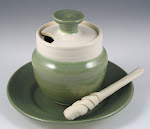Old: Cone 6 stoneware glazes I've been using for a long time
Hypothesis: These stoneware glazes will work just as well on the porcelain as they did on the stoneware, since the temp is the same, except run a little more and be brighter on the denser, whiter porcelain body. Unknown: whether the glazes will craze (form little crackles) on the porcelain where they didn't on the stoneware; opposite might also be true- where the glazes crazed on the stoneware, they might not on porcelain.
Conclusion: Very slightly more running where two glazes meet. Colors brighter as expected. (Time to discard the Licorice Black which doesn't like the porcelain.) Underglazes have great potential for added color under Elaine's Clear. So far Elaine's looks like it isn't crazing on the porcelain...it did on the stoneware.
Gut reaction: Good!
 |
| an array of color |
Dragon Lady was still at 255 degrees Fahrenheit when I unloaded the ware. Hence the gloves.
Except for the bigger blue bowl, these test pieces were all thrown from 1-lb to 1-lb 2-oz balls of clay. I gave the pots free-and-easy ridges and bulges for the glazes to find their way into higher and lower areas. Randy's Red got busy in the ups and downs and ins and outs of this bowl:
 |
| Randy's Red went all groovy |
and Price Green had a nice time with this one:
 |
| Price Green with Randy's Red at the rim |
Chinese Blue-Green and Nutmeg were quiet and soft on this mug:
 |
| Come upstairs to my kitchen, you muggy thang |
I played with Shelley's Blue speckles (used a mouth atomizer) on the Chinese Blue-Green bowl. Shelley's Blue, as you can see from the topmost photo in this post, will knock your eyes out because the cobalt blue is so strong. Some love it, but I prefer just a touch of Shelley's instead. This looks like old-time spatterware:
 |
| Chinese Blue-Green with speckles of Shelley's Blue |
This is the first of a group of tiny hand pleasers that I've glazed, with Randy's Red. Hello, hedgehog.
 |
| Little Hedgehog |
I had 10 stripey test pots, which were cylinders thrown without bottoms and brushed with stripes of underglaze in various colors. Bright commercial underglazes used to be able to stand only several hundred degrees of temperature below Cone 6, but they are now being formulated to hold up to higher temps than they used to. Two that were especially good were a strong red and a strong orange that are true and glossy under the clear glaze. Several more, like chartreuse and salmon, stayed very slightly matte but I think they will be workable.
The purpose of these underglazes is to add otherwise hard-to-get bright colors to my palette. I am going to experiment with underglaze designs next, using paper templates and freehand brushwork. Stay tuned!
It's already been a very interesting morning in the studio.


